At first, hard water doesn’t seem like a big deal. You might notice your soap isn’t lathering well in the shower, or maybe your clean dishes have spots on them. Over time, though, the signs get harder to ignore — white, chalky buildup around your faucets, sluggish water flow, and appliances that don’t work as well as they used to. By the time you realize what’s happening, hard water may have already taken a toll on your home’s plumbing system.
The good news? You’re not stuck with it. Understanding how hard water affects plumbing and knowing what you can do about it can save you from expensive repairs down the road.
How Hard Water Affects Plumbing
Hard water can cause plumbing problems in ways that aren’t always obvious at first. Here’s how:
Mineral Buildup in Pipes
Over time, calcium and magnesium deposits build up inside your pipes, restricting water flow. This is especially problematic in older homes with steel or copper pipes. If you’ve noticed reduced water pressure, it could be due to this hidden buildup.
Clogged Fixtures and Appliances
Your sink, shower, and dishwasher can suffer from limescale buildup. The tiny holes in showerheads can get blocked, making your relaxing morning shower feel more like a trickle. Washing machines and dishwashers also lose efficiency as hard water clogs their inner components.
Shortened Appliance Life Expectancy
Hard water affects more than just pipes. Water heating systems, coffee makers, and even garbage disposal units suffer from scale buildup, leading to costly repairs or premature replacements. A heating element covered in limescale works harder, increasing energy consumption and shortening its lifespan.
Increased Plumbing Repairs
The effects of hard water on your plumbing system don’t stop at reduced efficiency. Hard water leads to corrosion, leaks, and blockages, making regular plumbing maintenance necessary. If left untreated, these problems can spiral into expensive plumbing repairs.
Soap Scum & Stained Fixtures
Hard water prevents soap from fully dissolving, leading to soap scum buildup in your shower, sink, and bathtub. It also causes white, chalky stains on faucets and fixtures, making your bathroom and kitchen look dirty even when they’re clean.
Can You Reverse Hard Water Damage?
If you’re dealing with years of hard water buildup, you might wonder if the damage can be undone. So, can you reverse hard water damage? In some cases, yes. Using descaling agents like vinegar can help dissolve limescale in showerheads and faucets. Professional cleaning and water treatment systems can help restore efficiency to pipes and appliances. However, the best way to protect your home from hard water damage is to prevent it in the first place.
How to Protect Your Plumbing From Hard Water
Now that you understand how hard water affects plumbing, you might be curious about ways to protect your plumbing from its effects. If hard water has already made itself at home in your plumbing, don’t worry — there are solutions.
Install a Water Softener
The most effective way to protect your plumbing is with a water softener. These systems use ion exchange to remove calcium and magnesium, replacing them with sodium or potassium. This prevents mineral buildup and extends the life of your pipes and appliances. Busy Bee Plumbing, Heating & Air Conditioning offers Nashville water treatment services that can help keep your water soft and your plumbing safe.
Use a Reverse Osmosis System
For better drinking water, a reverse osmosis system can remove minerals and impurities, giving you cleaner, better-tasting water straight from the tap. This also helps protect appliances like coffee makers and dishwashers from scale buildup.
Regular Plumbing Maintenance
Scheduling routine plumbing maintenance can catch hard water problems before they get out of hand. A professional plumber can check for scale buildup, corrosion, and leaks, saving you money on major repairs down the road.
Use Vinegar to Clean Fixtures
For a DIY fix, you can try soaking showerheads and faucet aerators in vinegar to dissolve limescale. Running vinegar through your washing machine and dishwasher can also help clear out mineral deposits.
How Long Does It Take Hard Water to Ruin Pipes?
The timeline depends on factors like water hardness levels, pipe material, and how often you use plumbing fixtures. In some cases, significant buildup can occur in just a few years. If left untreated, hard water can shorten the life expectancy of your pipes and appliances, leading to costly replacements.
The Bottom Line
So, can hard water cause plumbing problems? As you can see, the effects of hard water on your plumbing system go beyond minor inconveniences. Over time, mineral buildup can clog pipes, reduce water pressure, and damage appliances, leading to costly repairs. Understanding how hard water affects plumbing helps homeowners take the right steps to protect their systems.
Is It Time to Tackle Your Hard Water Problem in Nashville, Tennessee?
If you’re tired of dealing with soap scum, clogged pipes, and expensive plumbing repairs, it’s time to take action. Hard water can cause plumbing problems, but the right solutions can save you time, money, and stress.
At Busy Bee Plumbing, Heating & Air Conditioning, we specialize in keeping your home’s plumbing and water systems running smoothly. Our team is fully trained, licensed, and insured, and we back our work with a 100% guarantee. We treat your home like our own, and we don’t believe in hidden charges — just honest, reliable service.
We offer professional plumbing services in Nashville, TN, and the surrounding areas to help protect your home from hard water damage. Give us a call today at 615.991.2145 to schedule an appointment!
Our service areas also include:
- Lebanon, TN
- Mt. Juliet, TN
- Hermitage, TN
- Franklin, TN
- Brentwood, TN
- Cookeville, TN
- Murfreesboro, TN
- Hendersonville, TN
- Smyrna, TN
- La Vergne, TN
- Clarkesville, TN
- Thompson Station, TN
- Spring Hill, TN
- Columbia, TN



